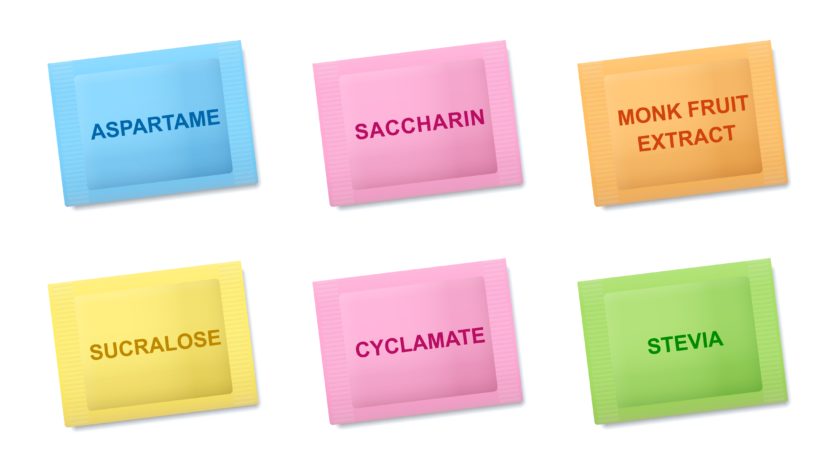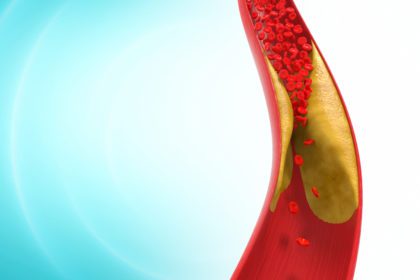Question: What’s your take on Stevia as a sugar substitute? I use a flavored coffee creamer (French vanilla or Irish cream) in my coffee and would like to add some kind of sweetener. From John S., San Ramon, CA
Answer: First, the flavored coffee creamers are already sweetened. The primary ingredients of commercial creamers are oil, sugar and artificial flavor/color. See my post on Creaming Up Your Coffee for healthier alternatives.
Second, almost all of my patients with type 2 diabetes are hooked on calorie-free sugar substitutes, struggling with their weight and have cardiovascular disease. Coincidence?
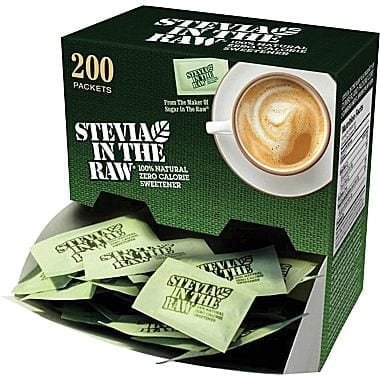 Maybe not. Studies show the consumption of nonnutritive sweeteners was associated with increases in weight and waist circumference, and higher incidence of obesity, hypertension, metabolic syndrome, type 2 diabetes, and cardiovascular events.
Maybe not. Studies show the consumption of nonnutritive sweeteners was associated with increases in weight and waist circumference, and higher incidence of obesity, hypertension, metabolic syndrome, type 2 diabetes, and cardiovascular events.
Also, compared to people who avoid diet or regular soft drinks, diet soda drinkers also appear to have elevated risks for:
- Type 2 diabetes
- Heart disease
- Metabolic syndrome (the name of a cluster of risk factors that occur together and increase your risk for coronary artery disease, stroke, and type 2 diabetes). See Why Metabolic Syndrome Matters
If you have metabolic syndrome, you have 3 or more of the following:
- Large waistline (abdominal obesity, a.k.a. belly fat)
- High triglycerides OR you’re on medication to treat high triglycerides
- Low HDL (“good”) cholesterol level OR you’re on medication to treat low HDL’s
- High blood pressure OR you’re on medication to treat high blood pressure
- High fasting blood sugar OR you’re on medication to treat high blood sugar
But It’s “Natural”…
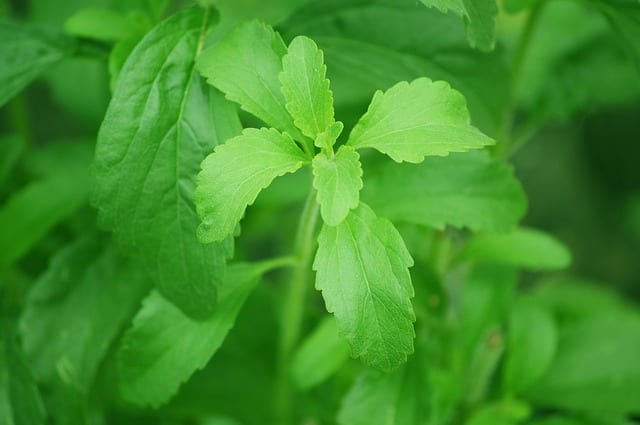
Stevia is a plant native to South America, a.k.a. sweetleaf or sugarleaf, and is processed to produce a calorie-free sugar substitute.
Because it’s derived from a plant, food companies market stevia as a “natural” sweetener to appeal to dieters, diabetics and health-conscious individuals who presume it must be healthier and safer than those originating in a lab.
Unless you are eating stevia in its whole-leaf or crude form (which is NOT FDA-approved due to possible health effects), it isn’t all that “natural”.
Sweeter Than Sugar
To produce stevia commercially, the plant is chemically processed into a powder or liquid extract. Like other sugar substitutes, Stevia can cause more harm than regular sugar due to its potent sweetness. Refined stevia extract has up to 300 times more sweetness than sugar. It joins other nonnutritive sweeteners like:
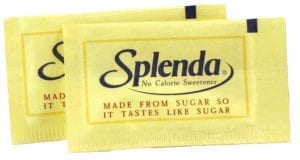
- Aspartame (Equal, NutraSweet) – 160-200 times sweeter than sugar
- Sucralose (Splenda) – 600 times sweeter than sugar
- Saccharin (Sweet’N Low) – 300 times sweeter than sugar
Desensitizing Your Sweet Tooth
Since sugar substitutes are extremely sweet, it’s not unusual that “artificial sugar junkies” become desensitized to sweetness.
Typically, their diet consists of diet soda, “sugar-free” drinks, cereals and snacks as well as coffee, tea or oatmeal heavily spiked with a sugar substitute. As a result, fresh fruit doesn’t taste sweet enough and they pour on a sweetener to make them more appetizing.
Drug Interactions
If you have type 2 diabetes, you need to monitor your blood sugar closely if you consume stevia. Stevia can interact with diabetes drugs as well as blood pressure medications and lithium (for bipolar disorder).
Kick the Habit

http://bit.ly/1jiuf0J
Consider these options instead of sweetened coffee/iced tea or soda:
- Green tea, black tea (rich in antioxidants)
- Iced tea with fresh lemon
- Mugicha or roasted barley tea (a popular caffeine-free Japanese iced tea)
- Fruit-infused water (click here for recipes)
- Unsweetened almond milk (a source of the antioxidant vitamin E and healthy omega-3 fats)
- Nonfat milk (a source of calcium and vitamin D)
- Seltzer water (a sodium-free carbonated water) – If desired, add a splash of antioxidant-rich 100% Concord grape juice
Instead of sweetening your morning bowl of oatmeal with a sugar substitute, consider the following instead:
- Raisins
- Chopped dates or date sugar (powdered dehydrated date)
- Dried or freeze-dried fruit, such as mango or strawberry banana (NO added sugars, oils, preservatives, or sulfur)
- Fresh berries
- Sliced bananas
![]() Karen’s Fit Tip: If you’re trying to lose weight and/or improve your health, consume foods as close to nature as possible. That is, get Real Food and avoid manufactured sweeteners as well as artificial colorants and preservatives.
Karen’s Fit Tip: If you’re trying to lose weight and/or improve your health, consume foods as close to nature as possible. That is, get Real Food and avoid manufactured sweeteners as well as artificial colorants and preservatives.
The idea is to break the sugar addiction, and enjoy the natural goodness of fresh fruits, vegetables, nuts and seeds, legumes and whole grains.

